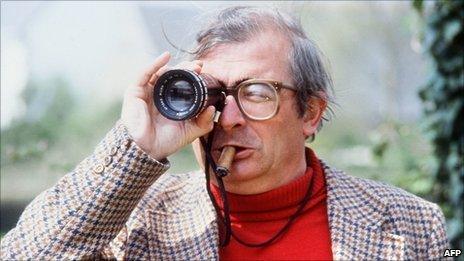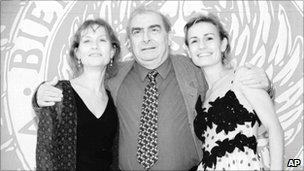French New Wave film-maker Claude Chabrol dies
- Published

Chabrol made more than 50 films during his career
One of France's best-known film directors, Claude Chabrol, has died at the age of 80.
Chabrol is best known for 1960s and 70s thrillers such as The Unfaithful Wife, The Butcher and This Man Must Die.
A member of the French New Wave movement, his contemporaries included Eric Rohmer and Jean-Luc Godard.
"With the death of Claude Chabrol, French cinema has lost one of its maestros," said French Prime Minister Francois Fillon in a statement.
French President Nicolas Sarkozy described Chabrol as a "great author and great film-maker".
Paris Mayor Bertrand Delanoe hailed Chabrol as "the inventor of inspired, rich and profoundly human movies".
Thierry Fremaux, who runs the Cannes Film Festival, told French radio station, France Info: "Claude Chabrol is part of our national patrimony - for his films and also for his personality."
Bourgeois repression
Chabrol made more than 50 films during his career.
Les Cousins won the Golden Bear at the Berlin Film Festival in 1959. He returned last year to receive the Golden Camera award for lifetime achievement.
Claude Chabrol appearing at a book signing and receiving an award
Two of Chabrol's films were nominated for Canne's Palme d'Or - the acclaimed Violette Noziere in 1978, based on the true story of a 19-year-old girl who was convicted of poisoning her father and attempting to kill her mother, and Poulet au Vinaigre in 1985.
The Academie Francaise awarded him the Rene Clair Prize in 2005.
His final film, Bellamy, starring Gerard Depardieu, was released in 2009.
A common theme running through many of Chabrol's films was the tension between bourgeois repression and the expression of violence often simmering beneath.
The BBC's Hugh Schofield, in Paris, says The Butcher - which focuses on a series of murders in a provincial French town - was typical of Chabrol's style.
"It was this style of film... that created the adjective 'Charbrolesque' and invited inevitable comparisons with his great hero, Alfred Hitchcock," he said.
But he added: "Chabrol was never as serious or as deliberately rebellious as his contemporaries."
Three marriages
Born in Paris in 1930, Chabrol was a pharmacology student at the University of Paris before deciding to embark on a career in film.

Isabelle Huppert (left) appeared in several of Chabrol's films
In the 1950s, he was a critic for the influential French film magazine, Cahiers du Cinema, along with Godard and Francois Truffaut.
Toward the end of the 1970s, Chabrol began making television films and ventured into international collaborations.
French actress Isabelle Huppert appeared in several of Chabrol's films, including Violette Noziere and Une Affaire de Femmes in 1988, a movie about an abortionist who becomes the last woman to be guillotined in France. She also starred in 1991's Madame Bovary and the 1995 psychological thriller, La Ceremonie.
Chabrol's second wife, Stephane Audran, also starred in many of his films, including La Femme Infidele, Le Boucher and Juste Avant La Nuit, in 1970.
He married his third wife, Aurore Pajot, in 1983. He is survived by four children.
BBC News website readers have been telling us how they will remember Chabrol'sfilms. Here is a selection of their comments.
I used to watch Chabrol's films in the 1970s at a local art cinema the proper way, with subtitles. His films were a revelation. They made me think about, and question, my own responses. Do you laugh? Do you cringe? Usually I did both. I was a university student at the time and found that watching Chabrol's films was like taking an extra class. Joan Stuchner, Vancouver, Canada
I saw many of his films. Not all of them are masterpieces, and I had objections against his cynicism and pessimism, but his work is here to stay. He was a continuator of French literary naturalism in cinema, with a strong interest for provincial bourgeoisie. A great director - and a great man. Jean-Paul Doguet, Paris, France
Claude Chabrol was a legend! I recently bought the Chabrol collection, volumes one and two, and have fallen in love with his films and style. He was an iconic director and will be sorely missed. Jazzy Lemon, Newcastle, UK
I once assisted at the projection of the Murnau classic, L'Aurore, at which Chabrol was present. Afterwards he opened his commentary on the film by saying that he never talked about cinema with those who hadn't seen L'Aurore. Jeremy Stigter, Paris, France
With their sharp eye for the habits of the Gallic bourgeoisie, Chabrol's films proved him to be the true heir to Hitchcock in France. Pippa Jones, Wimbledon, London, UK